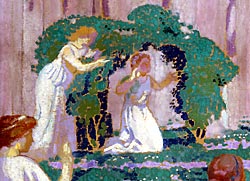
1910
Maurice Denis
Oil on linen
The Putnam Dana McMillan Fund
|
Orpheus was the son of the god Apollo and Calliope (kuh-LIE-uh-pee), the muse of epic poetry. Orpheus became a great musician. His
voice was more melodious than any other of his fellow-mortals. The songs he sang and the tunes he played on his lyre enchanted gods,
mortals, and beasts alike; even stones and trees came to him when he played.

|
Detail of Eurydice kneeling from Orpheus and Eurydice |
|
|
Orpheus married the beautiful nymph Eurydice. But on their wedding day a poisonous snake bit her and she died. Desperate to be reunited with his
beloved, Orpheus journeyed to the Underworld to beg the king and queen there to return Eurydice to him. As he sang his plea and played
his lyre, even the cold spirits of the Underworld wept. The king and queen granted the couple permission to leave together on the condition
that Orpheus must not look back at Eurydice until they were both completely out of the Underworld. Silently they made the arduous, dark
climb. But at the opening to the world, Orpheus, in his love for Eurydice, turned and looked at her. She slipped back into the darkness.
Orpheus returned to his world, wandered despondent through the woods and played music even more beautiful because it reflected his sadness.
There are several versions of how Orpheus met his death, but all of them feature women so affected by his music that they fall upon him,
tearing him from limb to limb, and fling his severed head into a river (or the sea). Orpheus's spirit returns to the Underworld, where he
is happily reunited with Eurydice.
|











